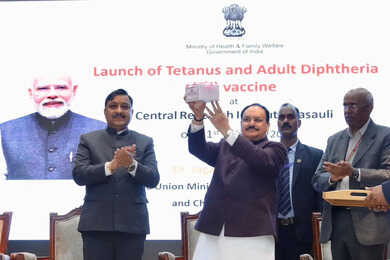- Health Conditions A-Z
- Health & Wellness
- Nutrition
- Fitness
- Health News
- Ayurveda
- Videos
- Medicine A-Z
- Parenting
Manganese And Magnesium Are Not The Same

Credit: Canva
Have you ever noticed both magnesium and manganese written on the food labels and wondered if they were the same thing? If yes, then you're not alone. Their similar names confuse many but these two essential minerals serve very different roles in the body, and mixing them up could lead to nutritional imbalances or even toxicity.
So What Differentiates Magnesium From Manganese?
The first key difference lies in how much of each your body needs. Magnesium is considered a macromineral, which implies that it is required in relatively large quantities—around 420 milligrams per day for adults. In contrast, manganese is a micromineral or trace mineral, with the recommended daily intake being just 2.3 milligrams. This stark contrast makes accurate dosing crucial, particularly when supplements are involved.
Overconsumption of this mineral can lead to toxicity or other health conditions. Magnesium plays a foundational role in over 300 enzyme systems in the body. These enzymes are involved in vital processes such as protein synthesis, muscle and nerve function, blood sugar regulation, and blood pressure control. It is also essential for the formation of DNA, RNA, and glutathione, as well as for energy production and maintaining heart rhythm through the proper movement of potassium and calcium across cell membranes. Essentially, magnesium is deeply involved in nearly every system in the body.
How To Get These Nutrients?
To ensure you're getting enough magnesium, aim for a diet rich in fibre. Foods such as leafy green vegetables, legumes, nuts, seeds, and whole grains are excellent sources. Even certain types of water—like mineral or tap water—can contribute to your magnesium intake.
Manganese, though needed in much smaller amounts, is no less important. This trace mineral supports several key functions, acting as a cofactor for enzymes like manganese superoxide dismutase, arginase, and pyruvate carboxylase. It plays a role in metabolising amino acids, cholesterol, carbohydrates, and glucose. Additionally, manganese is involved in bone formation, immune responses, and reproductive health. Notably, it also helps with blood clotting when working in tandem with vitamin K.
Word Of Caution: Some Food Inhibit Manganese Absorption
You can find manganese in many of the same foods that contain magnesium—leafy greens, legumes, nuts, and whole grains—as well as in teas. However, its absorption can be inhibited by certain compounds like phytic acid and oxalic acid, which are found in foods such as beans, spinach, and soy products. Even tannins in tea can slightly reduce how well your body absorbs manganese.While both minerals are vital, they are not interchangeable. Taking the wrong supplement or misjudging your dietary needs may mean missing out on the specific health benefits each mineral provides—or worse, consuming a toxic dose.
As with most nutrients, it is best to meet your mineral needs through a varied and balanced diet. Supplements can help in cases of deficiency, but should be used with caution and ideally under the guidance of a healthcare professional.
ALSO READ: India gets first-of-its-kind tech that tracks cancer tumours in real-time
Woman Lost Weight On Mounjaro But Her Breasts Didn't Stop Growing, This Is Why...

Credits: SWNS (Tianna Moon)
Mounjaro, a popular weight loss drug that helped many lose weight, however, in this one case, a woman, who was on the same drug noticed something different. While she lost weight, she noticed that her breasts continued to grow. The 30-year-old Tianna Moon of East Anglia, a region in eastern England first realized something was not normal with her chest in 2024. This was when she started to use Mounjaro.
She was losing weight, but her breasts continued to grow. This is when Moon's doctor diagnosed her with a rare disease call gigantomastia, which causes breast tissue to grow rapidly and in excess.
Also Read: 15 States Sue Trump Administration Over Revised Vaccine Schedule
Woman Lost Weight On Mounjaro But Her Breasts Didn't Stop Growing: What Happened To Her?
Moon said that the doctors had thought that she had macromastia, a less severe, however, a similar condition. "But when I broke down medical history, the weight loss on Mounjaro and the increased growth and side effects, he was point-blank like, 'This is gigantomastia'," she said.
Moon also told that her breasts currently weight 39 lbs, which is approximately 20 per cent of her overall body weight.
Moon also said that while her large breasts are "normal" at this point in her life, she said the rare condition still comes with challenges.
"The side effects are having numb arms quite a lot and having quite severe indentations on my shoulders. I have some light scarring under my breasts where bras have rubbed and ripped the skin open."
She also said that laying on her back is something she cannot do for a long time, as it restricts the amount of airflow she can get in. She also said that when she goes out she tries to make her breasts look smaller than they are and strap them up. "I [still] get stares and double takes."
Also Read: Wegovy And Ozempic Will Cost Less In 2027, Novo Nordisk Slashes Weight Loss Drugs Prices By Half
Woman Lost Weight On Mounjaro But Her Breasts Didn't Stop Growing: What Is Gigantomastia?
As per Cleveland Clinic, it is a rare condition where your breasts become excessively large. It can also cause pain, infection, discomfort and issues with body image. It is also known as breast hypertrophy where one experiences rapid and disproportionate breast growth. The speed with which the breasts grow could vary depending on the person. It could take a few weeks to over several years. The tissue is almost never benign.
Gigantomastia is characterized by:
- Breasts that have an excess of at least 5 pounds of breast tissue.
- Extra breast tissue that equals more than 3% of your total body weight.
There are different types of gigastomastia:
- Juvenile gigantomastia: This type happens during puberty.
- Gestational gigantomastia: This is when gigantomastia occurs during pregnancy.
- Drug-induced gigantomastia (or medication-induced): This happens after taking certain drugs.
- Idiopathic gigantomastia: This is when the cause of gigantomastia is unknown or can't be determined. Idiopathic gigantomastia is the most common type.
Moon is now considering a breast reduction surgery. She has for now set up an account on OnlyFans. “I might as well try and reap the benefits of my medical condition rather than the negatives," she said.
Indigenous Td Vaccine Rollout In India To Boost Immunity In Children, Adults, Say Experts

Credit: X
The recent launch of the indigenous Td vaccine in India by Union Health Minister JP Nadda will boost immunity and reduce the risk of tetanus and diphtheria in children and adults, said health experts.
Union Health Minister JP Nadda formally launched the indigenously manufactured Td vaccine in Himachal Pradesh last week.
With the launch, the Tetanus Toxoid (TT) vaccine has been replaced with the Tetanus and adult diphtheria (Td) vaccine in India’s immunization program for all age groups, including pregnant women.
The move comes amid increasing numbers of cases of diphtheria amongst older age groups. Tetanus and diphtheria can lead to hospitalizations or even cause death. The Td vaccine will help to decrease diphtheria outbreaks.
“In keeping with global practice, India has shifted from TT, which covers for tetanus, to Td, which covers for both tetanus and diphtheria. This vaccine is indigenously manufactured and is expected to significantly reduce the risk of both these diseases in older children as well as adults,” Dr. Rajeev Jayadevan, Ex-President of IMA Cochin and Convener of the Research Cell, Kerala, told HealthandMe.
What Is The Td Vaccine?
The Td vaccine, indigenously manufactured at the Central Research Institute (CRI), Kasauli in Himachal Pradesh, is a combination of tetanus and diphtheria with a lower concentration of diphtheria antigen (d), and is recommended for older children and adults.
The use of Td, instead of TT, is recommended during pregnancy to protect against maternal and neonatal tetanus and diphtheria during prenatal care.
Vaccination during pregnancy also serves to boost immunity and increase the duration of protection in pregnant women who have not received the full set of recommended booster doses.
The Td is a safe vaccine, and 133 countries are currently using it.
The Health Ministry, in a statement, said that the Central Research Institute will supply 55 lakh doses to the UIP by April 2026, with production expected to scale up progressively in subsequent years to further strengthen the Universal Immunization Program in India.
“India’s indigenous Td vaccine rollout marks a significant milestone in strengthening the nation’s immunization program by enhancing self-reliance, affordability, and supply stability,” Dr. Neha Rastogi, Senior Consultant - Infectious Diseases, Fortis Gurugram, told HealthandMe.
“Locally produced vaccines reduce dependency on imports, ensuring uninterrupted protection for adolescents and adults against tetanus and diphtheria. This initiative supports wider coverage, faster distribution to remote regions, and improved public health preparedness,” she added.
Tetanus And Diphtheria: Disease burden In India
As per the National Health Profile 2022, India has reported 1,586 cases and 22 deaths due to diphtheria in 2020, and 3,677 cases and 47 deaths in 2021.
Around 10 Indian states report the majority (84 per cent) of the cases.
As of 21 June 2024, Orissa has also reported six deaths and 21 suspected diphtheria cases. There has been more than 90 percent coverage of diphtheria vaccination in birth cohorts since 2014, but gaps in booster dose coverage are widely prevalent.
Plugging of gaps in the routine immunization, coupled with inclusion of booster doses in the national data on diphtheria vaccination, is the need of the hour.
“Diphtheria is one of the most dangerous infectious diseases known to man; it spreads easily through the respiratory route. It can cause death due to the bacterial toxin affecting the heart (Myocarditis). It is vaccine-preventable, but the immunity fades over time,” Dr. Jayadevan said.
Therefore, the Td booster shots at ages 10 and 16 are essential to maintain protection. Similarly, pregnant women should receive two doses to protect both mother and child.
Given the recent outbreaks of diphtheria in India and elsewhere, this transition is a public health priority, the expert said.
When Every Second Counts: Mastering Cardiovascular Emergencies

Credit: Canva
Cardiovascular emergencies remain among the most time-critical and life-threatening events in modern medicine. From sudden cardiac arrest to acute coronary syndromes and hypertensive crises, these conditions demand not only clinical excellence but also seamless systems of care. In an era where cardiovascular disease continues to dominate global mortality charts, preparedness is imperative.
Understanding Cardiovascular Emergencies
Cardiovascular emergencies encompass a spectrum of acute conditions that compromise cardiac output, coronary perfusion, or vascular integrity. These include myocardial infarction, cardiac arrhythmias, acute heart failure, aortic dissection, pulmonary embolism and cardiogenic shock. What unites them is speed: the window between reversible injury and irreversible damage is often measured in minutes.
Timely recognition of symptoms like chest pain, breathlessness, syncope, palpitations or sudden neurological deficits can dramatically alter outcomes. Delays, even minor ones, translate into myocardial loss, cerebral injury or death.
Acute Coronary Syndromes
Acute coronary syndromes (ACS) remain the cornerstone of cardiovascular emergencies. Plaque rupture and thrombosis can abruptly occlude coronary arteries, leading to unstable angina or myocardial infarction. Early electrocardiographic evaluation and cardiac biomarker guide diagnosis, but decisive action is paramount.
Rapid reperfusion, whether via thrombolysis or primary percutaneous coronary intervention, restores blood flow and salvages myocardium. Modern emergency cardiac care prioritises well-rehearsed protocols, ensuring that “door-to-balloon” times are aggressively minimised. In cardiovascular emergencies, hesitation is the enemy of survival.
When the Heart Loses Its Rhythm: Arrhythmias and Cardiac Arrest
Sudden cardiac arrest, often precipitated by malignant arrhythmias such as ventricular fibrillation or ventricular tachycardia, is the most dramatic cardiovascular emergency. Survival hinges on immediate cardiopulmonary resuscitation (CPR) and early defibrillation.
Equally dangerous are unstable bradyarrhythmias and supraventricular tachycardias, which can compromise haemodynamics within moments. Advanced cardiac life support protocols, continuous monitoring, and access to defibrillation and pacing are non-negotiable components of any emergency-ready healthcare facility.
Hypertensive and Aortic Emergencies
Hypertensive emergencies occur when severely elevated blood pressure causes acute target-organ damage, affecting the brain, heart, kidneys, or eyes. Stroke, acute left ventricular failure, and myocardial ischaemia are common and devastating consequences.
Aortic dissection, though less common, is among the deadliest cardiovascular catastrophes. Sudden tearing chest or back pain, pulse deficits, and blood pressure differentials demand immediate imaging and surgical consultation. Here, precision in diagnosis and blood pressure control can mean the difference between life and sudden death.
The System Behind The Save: Integrated Emergency Cardiac Care
Effective management of cardiovascular emergencies extends beyond individual expertise. It relies on an integrated ecosystem, trained emergency teams, rapid diagnostics, catheterisation laboratories, cardiac intensive care units, and post-event rehabilitation.
Hospitals that invest in protocol-driven care pathways, continuous staff training, and advanced cardiac technology consistently achieve superior outcomes. Equally vital is public awareness: early symptom recognition and prompt presentation to medical facilities significantly reduce mortality.
Preparedness Is The New Prevention
While prevention remains the long-term strategy against cardiovascular disease, preparedness defines survival during emergencies. From ambulance services equipped with defibrillators to hospitals offering round-the-clock cardiac intervention, readiness saves lives.
Cardiovascular emergencies do not announce themselves politely. They arrive uninvited, escalate rapidly, and punish complacency. In these moments, excellence is measured not in intent but in response.
© 2024 Bennett, Coleman & Company Limited

